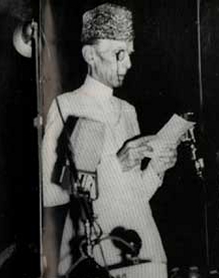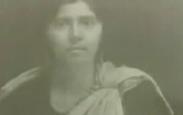Flagstaff commonly refers to:
Ghulam Ali Allana known as G. Allana was a friend and biographer of Muhammad Ali Jinnah, the founder of Pakistan. Mr. Allana entered politics at an early age and played an active part in the Pakistan movement. After Partition, he was instrumental in forming the Federation of Pakistan Chambers of Commerce & Industry. He was a member of the West Pakistan Legislative Assembly, besides being the mayor of Karachi. Internationally, Mr. Allana represented Pakistan at over 100 conferences, served on the governing body of the International Labour Organisation, and the president of the International Organisation of Employers, Brussels. At the United Nations he led a number of peace and diplomatic initiatives/working groups and went on to become chairman of the United Nations Commission on Human Rights in 1975. For his contributions he was awarded the United Nations peace medal and was also a nominee for the Nobel Peace Prize in 1977. He was also an English-language Pakistani poet and a counselor and friend to Fatima Jinnah, Muhammad Ali Jinnah's sister.

Ibrahim Ismail Chundrigar, best known as I. I. Chundrigar, was a Pakistani politician who served as the sixth prime minister of Pakistan, appointed in this capacity on 17 October 1957. He resigned due to a vote of no confidence on 11 December 1957, against him.

Dina Wadia was the daughter of Muhammad Ali Jinnah, the founding father of Pakistan and Rattanbai Petit. She belonged to the prominent Jinnah family through her father, the Petit family through her mother, and to the Wadia family through her marriage to Neville Wadia.

Wazir Mansion, officially known as Quaid-e-Azam Birthplace Museum is a former family home in the Kharadar district South at Karachi, Sindh, Pakistan which is considered the birthplace of the country's founder, Muhammad Ali Jinnah.

Fatima Jinnah was a Pakistani politician and stateswoman. She was the younger sister of Muhammad Ali Jinnah, the founder and the first governor-general of Pakistan. She was the Leader of the Opposition of Pakistan from 1960 until her death in 1967.

Mazar-e-Quaid, also known as Jinnah Mausoleum or the National Mausoleum, is the final resting place of Muhammad Ali Jinnah, the founder of Pakistan. Designed in a 1960s modernist style, it was completed in 1971, and is an iconic symbol of Karachi as well as one of the most popular tourist sites in the city. The mausoleum complex also contains the tomb of Jinnah's sister, Māder-e Millat Fatima Jinnah, as well as those of Liaquat Ali Khan and Nurul Amin, the first and eighth Prime Ministers of Pakistan respectively. The tomb of Sardar Abdur Rab Nishtar, a stalwart of the Muslim League from Peshawar, is also located there.

Quaid-e-Azam Residency, also known as Ziarat Residency, is located in Ziarat, Balochistan, Pakistan. It is where Muhammad Ali Jinnah spent the penultimate month of his life, nursed by A. S. Nathaniel. It is the most famous landmark of the city, constructed in 1892 during the British Raj. The building is a wooden structure, originally designed as a sanatorium before being converted into the summer residence of the agent of the Governor General. It is declared a heritage site and is of great architectural importance.
Rahil Begum Sherwani was the founder of the All India Women's Muslim League. The AIWML was the women's wing of the All India Muslim League. It was inaugurated by Muhammad Ali Jinnah in Aligarh in 1938. She was the younger sister of the famous Indian scholar Haroon Khan Sherwani and the daughter of Haji Musa Khan Sherwani.

Muhammad Ali Jinnah's 11 August Speech is a speech made by Muhammad Ali Jinnah, founding father of Pakistan and known as Quaid-e-Azam to the Constituent Assembly of Pakistan. While Pakistan was created as a result of what could be described as Indian Muslim nationalism, Jinnah was once an ambassador of Hindu-Muslim unity. When the Partition of India finally occurred, Jinnah, soon-to-be Governor-General of the Dominion of Pakistan, outlined his vision of Pakistan in an address to the Constituent Assembly, delivered on 11 August 1947. He spoke of an inclusive and impartial government, religious freedom, rule of law ,and equality for all.

Sardar Amir Azam was a Pakistani politician and entrepreneur. Azam was a cabinet minister during the 1950s and was the pioneer of low cost housing in Pakistan. He initially emerged in 1951 as an M.C.A. in the very first Pakistani Government headed by Mr. Liaquat Ali Khan, and later re-emerged as the Minister of State and the Central Minister, several times in the succeeding Pakistani Governments. He held multiple portfolios simultaneously. He is buried at Garhi Afghanan,near Taxila, his ancestral graveyard.

The Jinnah family was a political family of Pakistan. Jinnahs have played an important role in the Pakistan Movement for creation of Pakistan, a separate country for Muslims of India. The family held the leadership of All-India Muslim League, and its successor, Muslim League, until it dissolved in 1958 by martial law. Originally from a Gujarati Khoja background, they moved to Karachi from Kathiawar, Bombay Province in 1875.

Muhammad Ali Jinnah was a barrister, politician and the founder of Pakistan. Jinnah served as the leader of the All-India Muslim League from 1913 until the inception of Pakistan on 14 August 1947, and then as the Dominion of Pakistan's first governor-general until his death.

Emibai Jinnah was the first wife of Muhammad Ali Jinnah, the founding father of Pakistan, from 1892 until her death in 1893.
Sharif al Mujahid was a Pakistani journalist, historian, author, and professor.

Jinnah's Birthday, officially Quaid-e-Azam Day and sometimes known as Quaid Day, is a public holiday in Pakistan observed annually on 25 December to celebrate the birthday of the founder of Pakistan, Muhammad Ali Jinnah, known as Quaid-i-Azam. A major holiday, commemorations for Jinnah began during his lifetime in 1942, and have continued ever since. The event is primarily observed by the government and the citizens of the country where the national flag is hoisted at major architect structures such as private and public buildings, particularly at the top of Quaid-e-Azam House in Karachi.
Flagstaff House may refer to:














